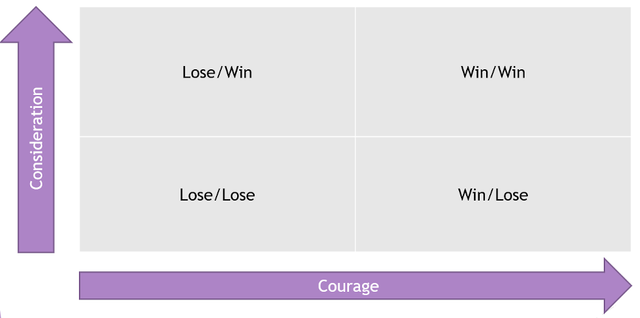
7 Habits Overview
The 7 Habits of Highly Effective People is a book written by Steven Covey that I have introduced in previous posts. Reading the first four posts will help gain a better understanding of some of the terms used here.
- Introduction to Effectiveness
- Habit 1 - Be Proactive
- Habit 2 - Begin With the End in Mind
- Habit 3 - Put First Things First
The first three habits are about taking control of our own lives as part of our journey to become more effective. Covey calls them, "private victories" as they are inward-looking to ourselves. They help us move from being dependent to independent thinking people.
We will now look at Habit 4 which is a "public victory" and helps us move from being an independent person to interdependent.
Prelude to Habit 4
To illustrate the essence of Habit 4, I am going to start with a short story.

"I promised our son that I would take him camping as the start of the summer holiday. He has been looking forward to it all year. In fact, it is what motivated him to study. It means so much to both of us." the father explained. He really didn't want to give up this opportunity he had been looking forward to.
"Well it just isn't possible now. My mother is not well and we can't go away now. I want to make sure that I am close to her." The mother replied.
"Your mother is always not well and that will be the same in a few months time." he retorted. He knew it sounded cruel but it was true, they couldn't always sacrifice every activity in their life. "Your sister could come and look after her."
"That's not the point. If anything happened, I want to be with her." she replied. She knew it would be hard on them, they had so much been looking forward to the camping trip.
Habit 4 - Think Win/Win
We are scripted in life to think Win/Lose. When we get higher marks in our school test or when we win at a sports event, we compare ourselves to others that didn't do so well. We feel that we are doing well in life when we compare ourselves to those around us.
Win/Win is a way of seeing life in a non-competitive way because if one of us loses - we both lose in the long run. For example, if I negotiate with my supplier and feel I have won, and the supplier feels they have lost. The supplier will perhaps not want to supply to me again. Win/Win is where we both walk away happy and in the long run, will lead to higher effectiveness in our relationship. We both get to eat from the cake and the cake tastes damn good.
In the long run, if it isn't a win for both of us, we both lose. That's why win-win is the only real alternative in interdependent realities.
Dr Stephen R. Covey
In the story above, can you think of any Win/Win resolutions? Perhaps the father could go camping and the mother stays at home? Or perhaps the father could change the camping to be close to home so that they could still be close to the wife's mother. If both sides feel that they have come away with a good result - that is Win/Win.
Consideration and Courage
Many people think in terms of either/or: either you're nice or you're tough. Win-win requires that you be both.
To gain Win/Win you need to be considerate of what the other party is after. At the same time, you need to have the courage to push your own agenda.
The following shows how the various possibilities play out depending on how we go into a negotiation with consideration and courage.

To achieve Win/Win in our lives we need to build a strong character with the following 3 traits:
- Integrity – This means we do what we say we are going to do. We don't just talk the talk; we walk the walk.
- Maturity - This is the ability to express one’s own feelings and convictions balanced with consideration for the thoughts and feelings of others. We need empathy.
- Abundance mentality – We need to live life believing that there is enough to go around for everyone. When we feel that success is scarce we are willing to stand on each other's shoulders to get ahead. With the right mentality, we will be open for others being successful too.
Win/Win Relationships
Relationships are key to dealing with someone entrenched in a Win/Lose mentality. To break this mould we need to make deposits into the Emotional Bank Account through genuine courtesy, respect, and appreciation for that person and for their alternative point of view. You need to be persistent until the other person begins to realise that you genuinely want the resolution to be a real win for both of you.
This very process of persistently looking for Win/Win is a tremendous deposit in the Emotional Bank Account.
Next Post
We will look at Habit 5. Please comment below as to what you think about Habit 4.
I love this book, even though it is a bit dry and long - however, the principles are awesome and of such great help! :) I have to say that the first three principles are my favorite principles, but the rest are really useful as well!
Downvoting a post can decrease pending rewards and make it less visible. Common reasons:
Submit
I agree the book is long and hard read. One of the reasons I thought to summarise. They are universal and as you say very helpful.
Thanks for your comment.
Downvoting a post can decrease pending rewards and make it less visible. Common reasons:
Submit